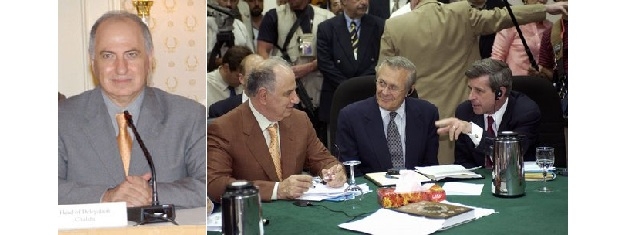Local
IRAQI POLITICIAN AHMED SHALABI WHO CHAMPIONED US INVASION OF IRAQ IN 2003
HAS DIED OF HEART ATTACK IN BAGHDAD HOME

Ahmed Chalabi, Paul Bremer & Donald Rumsfeld (Source: Wikipedia)
USPA NEWS -
Ahmed Chalabi, the Iraqi politician most associated with persuading the US to invade in 2003, has died aged 71. Living in exile as head of the Iraqi National Congress (INC), which opposed Saddam Hussein, Chalabi became a White House favourite after he provided information that supported...
Ahmed Chalabi, the Iraqi politician most associated with persuading the US to invade in 2003, has died aged 71. Living in exile as head of the Iraqi National Congress (INC), which opposed Saddam Hussein, Chalabi became a White House favourite after he provided information that supported the US justification for invading Iraq in 2003. He was once championed by the United States as a potential leader of Iraq.
But they fell out after the invasion turned into a bloody occupation, and information which he had provided about Saddam Hussein's weapons of mass destruction capability was discredited. Mr Chalabi was also in charge of the commission that stripped members of Saddam's Baath party of their positions and is seen as one of the causes of the current sectarian strife in Iraq. (BBC)
Born into a privileged Shiite merchant family in the Iraqi capital, Dr. Chalabi basked for more than a decade in a high-
flying Washington portfolio as policy-shaping lobbyist, favored security adviser and U.S.-bankrolled opposition leader.... But even as Dr. Chalabi´s reputation eroded among his onetime American patrons, he managed to remain within clawing distance of the top tiers of political power in Iraq. Up until his final years, Dr. Chalabi was often mentioned as a candidate for leadership roles. (Washington Post)
flying Washington portfolio as policy-shaping lobbyist, favored security adviser and U.S.-bankrolled opposition leader.... But even as Dr. Chalabi´s reputation eroded among his onetime American patrons, he managed to remain within clawing distance of the top tiers of political power in Iraq. Up until his final years, Dr. Chalabi was often mentioned as a candidate for leadership roles. (Washington Post)
A mathematician with a Ph.D. from the University of Chicago, Mr. Chalabi, the son of a prominent Shiite family, cultivated close ties with journalists in Washington and London; American lawmakers; the neoconservative advisers who helped shape Mr. Bush´s foreign policy; and a wide network of Iraqi exiles, many of whom were paid for intelligence about Mr. Hussein´s government.(NY Times)
His group, the Iraqi National Congress, would get more than $100 million from the C.I.A. and other agencies between its founding in 1992 and the start of the war. He cultivated friendships with a circle of hawkish Republicans “” Dick Cheney, Douglas J. Feith, William J. Luti, Richard N. Perle and Paul D. Wolfowitz “” who were central in the United States´ march to war, Mr. Cheney as vice president and the others as top Pentagon officials. (NY Times)
Chalabi was also dogged by allegations of corruption and was convicted by a Jordanian court of embezzling funds from the collapsed Petra bank in 1992, a case he claimed was politically motivated.... Undaunted, he provided a steady stream of briefings that were used to bolster the case for the 2003 war, and his INC party provided a volunteer force that fought under US command during the invasion.... But having spent many years outside Iraq, his group was little-known and little-liked at home. Plans for a smooth political transition fell apart, and instead Iraq was plagued by years of bloodshed. (The Guardian)
Ruby BIRD
http://www.portfolio.uspa24.com/
Ruby BIRD
http://www.portfolio.uspa24.com/
Iraqi National Congress Saddam Hussein Mass Destruction Weapon Leader Occupation Bloody Politician Ahmad Chalabi United States Washington Invasion Iraq Ruby Bird
Liability for this article lies with the author, who also holds the copyright. Editorial content from USPA may be quoted on other websites as long as the quote comprises no more than 5% of the entire text, is marked as such and the source is named (via hyperlink).






